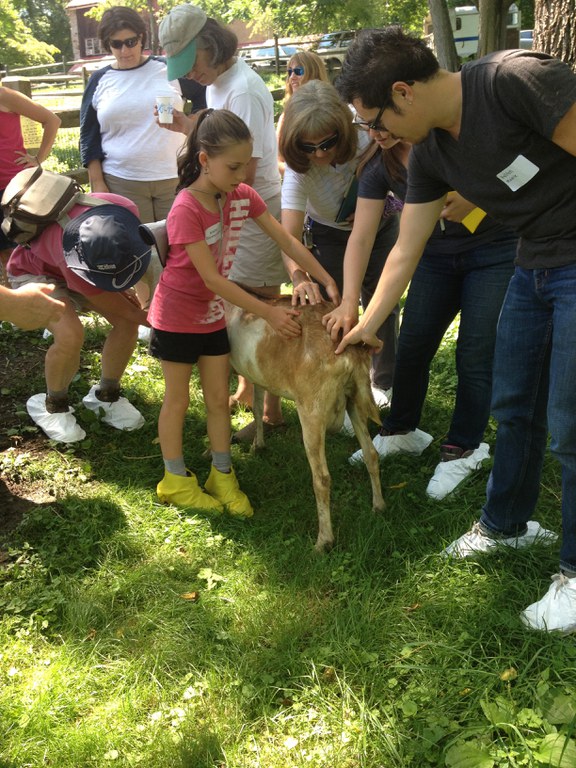PA-WAgN Dairy & cheese mentor Catherine Renzi and PSU Extension Educator Linda Spahr teach field day attendees about native plants goats can browse, nutritional needs and body scoring for health assessment.
Specialty Mentor Catherine Renzi hosted a PA-WAgN Field Day at Yellow Springs Farm to share her expertise on caring for dairy goats. The morning agenda focused mostly on goats' relationship to various species of native and non-native plants. In the afternoon, Cooperative Extension Educator Linda Spahr taught us about body condition scoring and allowed us to practice our new scoring skills on some of Catherine's goats.
Catherine fielded questions from participants about cheesemaking before we began our planned agenda. Then we went on a tour of the farm while Catherine pointed out many plants and trees, and discussed whether they were safe or toxic for goats to ingest. It turns out that determining what is safe for goats to eat can be very complicated, because some plants are safe most of the year but dangerous for a few months in the spring. Other plants have safe parts and dangerous parts (leaves vs, berries, berries vs. shoots). The sap of certain trees is also toxic to goats.
Several people who were present agreed that goats generally know what is safe for them to eat and what is not. However, Catherine cautioned that when goats have not accessed fresh vegetation for sometime, such as at the end of winter, they will eat almost any greens that they can find - even if it might be toxic. Catherine also shared an anecdote of an ill goat that wouldn't eat any food. Catherine gave her a salad bar of sorts, containing many different native plants, to see if she would eat any of it. Indeed she chose Jewelweed, and began to get healthier. Catherine explained that many goats seems to have knowledge of what plants are good for them, what is bad for them, and even which to use medicinally in some cases.
There was also a discussion of parasitic worms and how to both avoid and treat them. Catherine said that all animals that are new to their farm are wormed and quarantined for a period of time before they can join the herd. After that the herd is only wormed again if worms are found to be present. Catherine also added that a goat that needs to be wormed more than two times in a single year is culled from the herd. Catherine shared that one way to help prevent worms is to keep the pasture at least 4 inches in length because worms stay in the bottom four inches of the grass. It was also mentioned that research conducted at NC State has found the tannins in black walnut and oak to help prevent parasites. Someone added that putting goats in with cattle helps to break the parasite cycle.
After lunch, Extension Educator Linda Spahr taught us about body condition scoring - an important tool for evaluating the physical health of an animal. She described the difference between an emaciated animal (body score of 1) and a morbidly obese animal (body score of 5). She described what health animals look like and said that they should score as close to three as possible. She showed us how to feel an animal's spine, chest, and buttocks to score it. Linda pointed out that a 3 on one animal isn't necessarily a 3 on another animal, so it is important to get to know what is "normal" for each individual animal. She also noted that an animal's "normal" varies through its life course. For example, a big pear-shaped belly is good on a kid but not necessarily on an adult goat. After Linda's presentation, we walked down to the pasture to practice scoring the goats. Everyone seemed to pick up the general scoring pretty quickly, and they enjoyed meeting Catherine's goats - each of which had a distinct personality! We finished the day with open Q&A while some of the younger attendees held a sweet two-week old kid.
Catherine Renzi recommended that following books on native plants:
• The American Woodland Garden: Capturing the Spirit of the Deciduous Forest by Rick Darker
• anything by William Cullina
Pennsylvania Women's Agricultural Network
Address
302 Armsby BuildingUniversity Park, PA 16802
- Email pawagn@psu.edu
Pennsylvania Women's Agricultural Network
Address
302 Armsby BuildingUniversity Park, PA 16802
- Email pawagn@psu.edu


